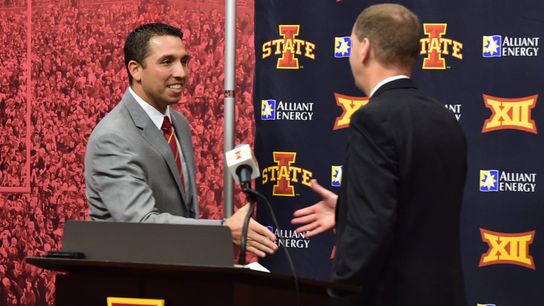Iowa State AD Jamie Pollard is a veteran of high-profile searches. Pollard hired Fred Hoiberg to turn around the Cyclones' basketball program in 2010. Five seasons after The Mayor successfully did that, leading Iowa State to back-to-back Big 12 Tournament championships before leaving for the Chicago Bulls after the 2015 season, Pollard hired Steve Prohm away from Murray State to keep Iowa State basketball rolling. Five months after hiring Prohm Pollard turned around and hired Matt Campbell away from Toledo to right Iowa State's struggling football program.
Armed with that experience, Pollard sat down with Parker Executive Search vice president Daniel Parker in this Athletic Director U interview to discuss the nature and mechanics of coaching searches.
To sniff out the all-important yet hard-to-grasp concept of "fit," Pollard asked himself if he could envision liking how a prospective coach would handle himself while wearing Iowa State colors during hard times.
"We all think they're going to win, right?" he said. "When you accept that and know they're not all going to win, now what are we really looking for? This may sound like you're looking at it through the wrong end of the lens but I always like to say, 'If they're not successful or when they hit adversity, what are they going to be like? Are they going to fit here when we go through those tough patches?' That's a big thing that I'm looking for because I'm looking for their personality, how are they really interacting with people? Do they understand at Iowa State what we're not and what we are?"
Pollard also broke down how Iowa State landed Campbell ahead of other suitors, crediting Parker with stationing the Cyclones brass at a hotel near Campbell outside the Glass Bowl in Toledo, allowing Pollard to lock him down on Saturday night while Parker set up six interviews for that late November Sunday in the event the Campbell interview didn't go well.
"Matt Campbell was our Candidate A," he said. "That was the person we definitely wanted to give the first opportunity. We could have met with him and it didn't go well. But because of what was happening in the market place at that time, in hindsight, yes, because Matt said yes and we really connected we probably could have done that without anybody in that process. But had he not connected with us or we didn't think he was the candidate I would have been left high and dry. Parker had everything set up. We were rolling, Sunday had six interviews scheduled. We were able to get the process done on that Saturday and that was probably a unique outcome that it went that way but I would have never gone into that process and left the institution exposed where on Saturday night it doesn't turn out and I'm going, 'Now what are we going to do?'"
Pollard answered a question often lobbed like a stale loaf of bread toward ADs: why hire a search firm at all? Isn't that your job? Parker, naturally, argued for the need of search firms, comparing his work to that of a real estate agent brokering the purchase of a million-dollar home and a confidant in times where ADs can talk to a small amount of people and trust even fewer, but Pollard for their necessity in terms of handling the little yet time-consuming details while allowing him to handle in-house politics.
"The logistics. Being able to make all the potential candidates feel special," Pollard said. "Being able to manage that process and deal with the personalities and the agents. To know who just is maybe trying to get a raise back at their home site and to know who is sincerely interested. To know, 'Well, did this candidate meet with somebody else before and how did that go?' That's invaluable for me, but it's taking all that busy work off my plate so that I can zero in on what really matters, which is figuring out who's the best person and not getting caught up in all the other clutter."
The discussion isn't necessarily the most entertaining 25 minutes you'll ever watch, but it's a good inside baseball talk for aspiring ADs and head coaches.
